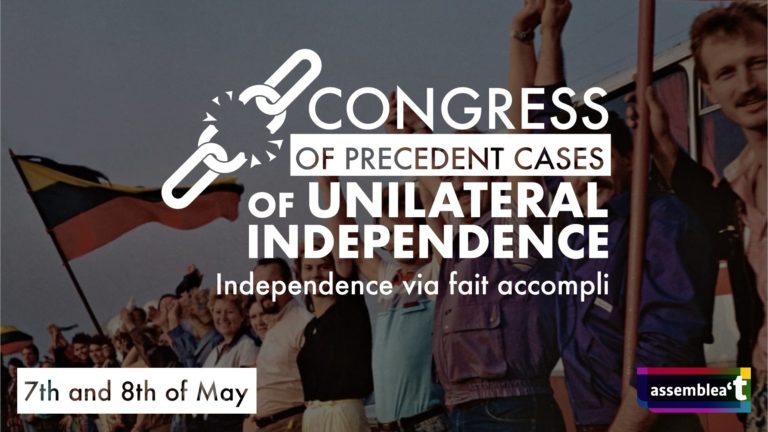
The “Congress of Precedent Cases of Unilateral Independence”, organized by the Catalan National Assembly, with representatives from the Baltic countries and Slovenia, took place from Friday the 7th of May to Saturday the 8th afternoon, with full attendance at all its workshops.
On the 7th and 8th of May, former representatives and civil society leaders from the Baltic states and Slovenia joined an online international congress which dealt with the independence processes in their respective countries, to gain insight into the future steps of the Catalan pro-independence movement. In total, over 200 participants took part in 5 workshops behind closed doors, while the public sections of the event were broadcasted live.
At the closure of the Congress, Assemblea President Elisenda Paluzie thanked the speakers for their participation and expertise, and she referenced recent news from part of the Catalan pro-independence movement “We cannot keep waiting for stale negotiation tables, we cannot keep missing out windows of opportunity looking at the Spanish state, giving up ground. At Assemblea we believe that is a mistake, not only because it won’t yield any results, but also it would mean losing a generation”. The President regarded the congress a great success in terms of participation, and in outlining an essential roadmap for the future of the Catalan pro-independence process.
Assemblea International Committee Coordinator Joana Pujol joined Ms. Paluzie in her message of thanks and solidarity with the Slovenian and Baltic peoples and added “We can conclude that without unilateralism, independence will not be possible. The relevance of popular pressure in the streets and a diplomatic strategy defending national goals in a broad number of foreign countries are key points.””
Catalan digital paper Nació Digital Journalist Roger Tugas, moderated the closure of the event, in which he highlighted “The Catalan pro-independence movement needs to prepare for those windows of opportunity, be proactive, not reactive. Civil society needs to be ready for when it has to go into the streets –and probably remain there longer– but also from the institutions, to meet the expectations”
The two-day event consisted of five workshops, held via Zoom in closed sessions. The inauguration and the closure were openly broadcast through Assemblea’s social media channels, and can be viewed here and here.
In different sessions, the congress dealt with topics such as economics, defense and security, international relations, their constituent processes, and their strategies of civil disobedience. The conclusions of the sessions will published in a few days, in a white paper on unilateral independence focusing on the Catalan case.
The event featured former Slovenian Foreign Affairs Minister Mr. Dimitrij Rupel, and former Baltic civil society leaders Mr. Ülo Laanoja and Mr. Vents Armands. The Congress also included Ramón Grosfóguel, a Puerto Rican activist and sociologist from the Department of Ethnic Studies at the University of California Berkeley, and Catalan experts and academicians Albert Noguera, Eulàlia Pasqual, Xavier Cuadras, Jordi Arrufat and Daniel Soler.
The examples of the Baltic countries and Slovenia were chosen since they are geographically and chronologically close to Catalonia—this year is the 30th anniversary of their independence, and for having achieved it in the face of a much more powerful state by means of democratic deluge, civil disobedience and fait acompli.